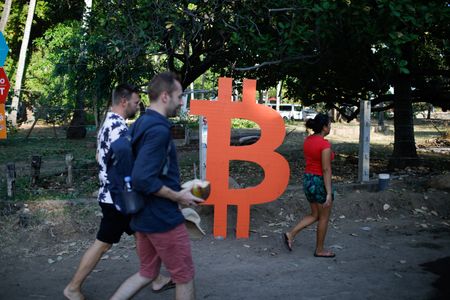By Brendan O’Boyle
(Reuters) – Risks over El Salvador’s embrace of bitcoin “have not materialized,” but use of the cryptocurrency still requires transparency and attention, the International Monetary Fund (IMF) said Friday in a statement after a visit to the Central American country.
“Given the legal risks, fiscal fragility and largely speculative nature of crypto markets, the authorities should reconsider their plans to expand government exposures to bitcoin,” the IMF said in a statement.
The annual visit by IMF staff followed a $600 million bond payment by El Salvador last month amid investor concerns over its financing sources and fiscal policy.
The IMF’s so-called “article IV” visit has been sharply critical in the past. El Salvador’s move to make bitcoin legal tender in September 2021 effectively closed the doors to IMF financing.
While the lender noted that risks “have not materialized due to the limited bitcoin use so far,” it said the cryptocurrency’s “use could grow given its legal tender status and new legislative reforms to encourage the use of crypto assets, including tokenized bonds.”
El Salvador’s Congress last month passed a law regulating the issuance of digital assets by both the state and private entities.
President Nayib Bukele announced on Twitter a series of purchases of some 2,380 bitcoin before mid November, when he said the Treasury would buy a bitcoin every day.
If those purchases were made, the government holds nearly 2,470 coins acquired for about $106.4 million. The current value of that investment is $52.2 million, for a paper loss over 50%.
The numbers are Reuters estimates, as the government does not officially disclose purchases, holdings or where the coins are kept.
“Greater transparency over the government’s transactions in bitcoin and the financial situation of the state-owned bitcoin-wallet (Chivo) remains essential,” the IMF said.
The IMF highlighted the “full recovery” of El Salvador’s economy to pre-pandemic levels, “driven by the effective government response to the health crisis.”
Real GDP is projected to grow by 2.4 percent in 2023, the IMF said, above the historical average.
However, the lender also expressed concern over a rising current account deficit and the possible spillover effects of a recession in the United States.
(Reporting by Brendan O’Boyle and Rodrigo Campos; Additional reporting by Kylie Madry; Editing by Anthony Esposito and David Gregorio)

